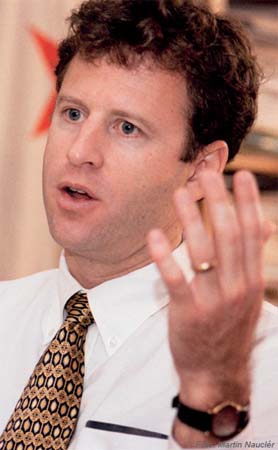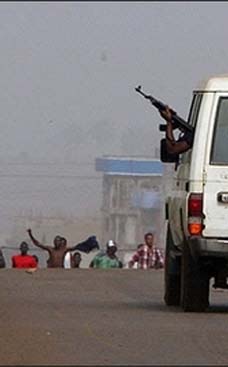2007.02.24: February 24, 2007: Headlines: Figures: COS - Congo Kinshasa: Foreign Policy: Brookings Institute: Washington Times: Michael O'Hanlon writes: The British troop drawdown works against the overall thrust of the surge strategy. It is not a fatal problem for the coalition, to be sure. But it is surely not good news.
Peace Corps Online:
Directory:
Congo - Kinshasa (Zaire):
Special Report: National Security Expert and Congo Kinshasa RPCV Michael O'Hanlon:
2007.02.24: February 24, 2007: Headlines: Figures: COS - Congo Kinshasa: Foreign Policy: Brookings Institute: Washington Times: Michael O'Hanlon writes: The British troop drawdown works against the overall thrust of the surge strategy. It is not a fatal problem for the coalition, to be sure. But it is surely not good news.
Michael O'Hanlon writes: The British troop drawdown works against the overall thrust of the surge strategy. It is not a fatal problem for the coalition, to be sure. But it is surely not good news.

While British forces are certainly strained in Iraq and Afghanistan and elsewhere, their proportional contribution to key allied military missions (adjusting for the two countries' relative populations) is less than half that of the United States. The real reason British troops are going home is not, first and foremost, because of excessive military strain. It is because British politics demand it. This news will not be welcome in the United States, and will not help Mr. Bush. Of course, it also needs to be put in perspective. Americans have long known they are getting only minimal help with this war, and have long wrestled with the fact it is not popular abroad. At this point, however, Americans are also pragmatic. They know the British presence, while important, is not huge to begin with. Michael O'Hanlon, a Senior Fellow at the Brookings Institute and a Visiting Lecturer at Princeton University, served as a Peace Corps Volunteer in Congo Kinshasa.
Michael O'Hanlon writes: The British troop drawdown works against the overall thrust of the surge strategy. It is not a fatal problem for the coalition, to be sure. But it is surely not good news.
Drawdown rationale and risks
By Michael O'Hanlon
February 24, 2007
The Bush administration is spinning as good news the British decision to reduce its presence in the southern Iraqi city of Basra by at least 1,500 troops. By this perspective, Prime Minister Tony Blair's decision reflects an improvement of the security situation in at least one Iraqi city and may provide a model for other parts of the country.
Indeed, the British decision to reduce its troop presence in Basra is understandable and probably acceptable at one level. Basra, an overwhelmingly Shia city, does not face the sectarian struggles Baghdad and other parts of central and northern Iraq have wrestled with over the last year. And it is further removed from the tactical sanctuaries and car bomb factories and operational headquarters of al Qaeda in Iraq, making it less prone to suffer from terrorist strikes.
To be sure, there are still risks for Basra in this decision. That city and its environs have faced serious periods of warfare among various contending Shia militias in recent years. Some militias are more closely affiliated with Iran, meaning Tehran may sense more of an opportunity now to promote extremist groups that are friendlier to its interests. And any increase in chaos, due to such intermilitia strife or to simple criminality, could slow efforts to make Basra an example for the rest of the country -- not to mention efforts to improve oil production and transportation in and around southern Iraq, something crucial to the entire country's economy.
Overall, however, I believe the local risks can be tolerated. If the rest of Iraq could have Basra's problems, we would all be better off. And on balance British troops have made a notable contribution.
But on balance the British decision is bad news. We need more help in Iraq, not less. The British troop drawdown works against the overall thrust of the surge strategy. It is not a fatal problem for the coalition, to be sure. But it is surely not good news.
The overall Iraq mission really needs more troops in and around Baghdad -- the city Tony Blair has just rightly said is crucial to the whole country's well-being. The fact the United States is adding 17,000 troops to its presence in Baghdad, consistent with the counterinsurgency strategy favored by Lt. Gen. David Petraeus, was determined by available American force levels. It is not truly an adequate number. As such, U.S. troops could certainly use help from NATO's most accomplished military in counterinsurgency and stabilization missions, the U.K. armed forces.
While British forces are certainly strained in Iraq and Afghanistan and elsewhere, their proportional contribution to key allied military missions (adjusting for the two countries' relative populations) is less than half that of the United States. The real reason British troops are going home is not, first and foremost, because of excessive military strain. It is because British politics demand it.
This news will not be welcome in the United States, and will not help Mr. Bush. Of course, it also needs to be put in perspective. Americans have long known they are getting only minimal help with this war, and have long wrestled with the fact it is not popular abroad. At this point, however, Americans are also pragmatic. They know the British presence, while important, is not huge to begin with.
And they also know we are in Iraq not because we want to be, not because we relish it, not because it is a well-received mission internationally, but rather because at this point we must find some way to salvage a minimal level of stability in Iraq (if at all possible) for Iraqis' good and our own strategic interests. The British decision will not change this basic reality.
Clearly, the main reason British troops are going home rather than to Baghdad has to do with British domestic politics more than any military or strategic rationale. While understandable at one level, and hardly the end of the world, it is also too bad given what it means for the burden faced by American troops -- and the still-mediocre prospects for success of the overall mission in Iraq.
Michael O'Hanlon is senior fellow at the Brookings Institution.
Links to Related Topics (Tags):
Headlines: February, 2007; RPCV Michael O'Hanlon (Congo Kinshasa); Figures; Peace Corps Congo Kinshasa; Directory of Congo Kinshasa RPCVs; Messages and Announcements for Congo Kinshasa RPCVs; Iraq
When this story was posted in March 2007, this was on the front page of PCOL:





Peace Corps Online The Independent News Forum serving Returned Peace Corps Volunteers
 | Chris Dodd's Vision for the Peace Corps
Senator Chris Dodd (RPCV Dominican Republic) spoke at the ceremony for this year's Shriver Award and elaborated on issues he raised at Ron Tschetter's hearings. Dodd plans to introduce legislation that may include: setting aside a portion of Peace Corps' budget as seed money for demonstration projects and third goal activities (after adjusting the annual budget upward to accommodate the added expense), more volunteer input into Peace Corps operations, removing medical, healthcare and tax impediments that discourage older volunteers, providing more transparency in the medical screening and appeals process, a more comprehensive health safety net for recently-returned volunteers, and authorizing volunteers to accept, under certain circumstances, private donations to support their development projects. He plans to circulate draft legislation for review to members of the Peace Corps community and welcomes RPCV comments. |
 | He served with honor
One year ago, Staff Sgt. Robert J. Paul (RPCV Kenya) carried on an ongoing dialog on this website on the military and the peace corps and his role as a member of a Civil Affairs Team in Iraq and Afghanistan. We have just received a report that Sargeant Paul has been killed by a car bomb in Kabul. Words cannot express our feeling of loss for this tremendous injury to the entire RPCV community. Most of us didn't know him personally but we knew him from his words. Our thoughts go out to his family and friends. He was one of ours and he served with honor. |
 | Peace Corps' Screening and Medical Clearance
The purpose of Peace Corps' screening and medical clearance process is to ensure safe accommodation for applicants and minimize undue risk exposure for volunteers to allow PCVS to complete their service without compromising their entry health status. To further these goals, PCOL has obtained a copy of the Peace Corps Screening Guidelines Manual through the Freedom of Information Act (FOIA) and has posted it in the "Peace Corps Library." Applicants and Medical Professionals (especially those who have already served as volunteers) are urged to review the guidelines and leave their comments and suggestions. Then read the story of one RPCV's journey through medical screening and his suggestions for changes to the process. |
 | The Peace Corps is "fashionable" again
The LA Times says that "the Peace Corps is booming again and "It's hard to know exactly what's behind the resurgence." PCOL Comment: Since the founding of the Peace Corps 45 years ago, Americans have answered Kennedy's call: "Ask not what your country can do for you--ask what you can do for your country. My fellow citizens of the world: ask not what America will do for you, but what together we can do for the freedom of man." Over 182,000 have served. Another 200,000 have applied and been unable to serve because of lack of Congressional funding. The Peace Corps has never gone out of fashion. It's Congress that hasn't been keeping pace. |
 | PCOL readership increases 100%
Monthly readership on "Peace Corps Online" has increased in the past twelve months to 350,000 visitors - over eleven thousand every day - a 100% increase since this time last year. Thanks again, RPCVs and Friends of the Peace Corps, for making PCOL your source of information for the Peace Corps community. And thanks for supporting the Peace Corps Library and History of the Peace Corps. Stay tuned, the best is yet to come. |
 | History of the Peace Corps
PCOL is proud to announce that Phase One of the "History of the Peace Corps" is now available online. This installment includes over 5,000 pages of primary source documents from the archives of the Peace Corps including every issue of "Peace Corps News," "Peace Corps Times," "Peace Corps Volunteer," "Action Update," and every annual report of the Peace Corps to Congress since 1961. "Ask Not" is an ongoing project. Read how you can help. |
Read the stories and leave your comments.

Some postings on Peace Corps Online are provided to the individual members of this group without permission of the copyright owner for the non-profit purposes of criticism, comment, education, scholarship, and research under the "Fair Use" provisions of U.S. Government copyright laws and they may not be distributed further without permission of the copyright owner. Peace Corps Online does not vouch for the accuracy of the content of the postings, which is the sole responsibility of the copyright holder.
Story Source: Washington Times
This story has been posted in the following forums: : Headlines; Figures; COS - Congo Kinshasa; Foreign Policy; Brookings Institute; Iraq
PCOL36530
17

















